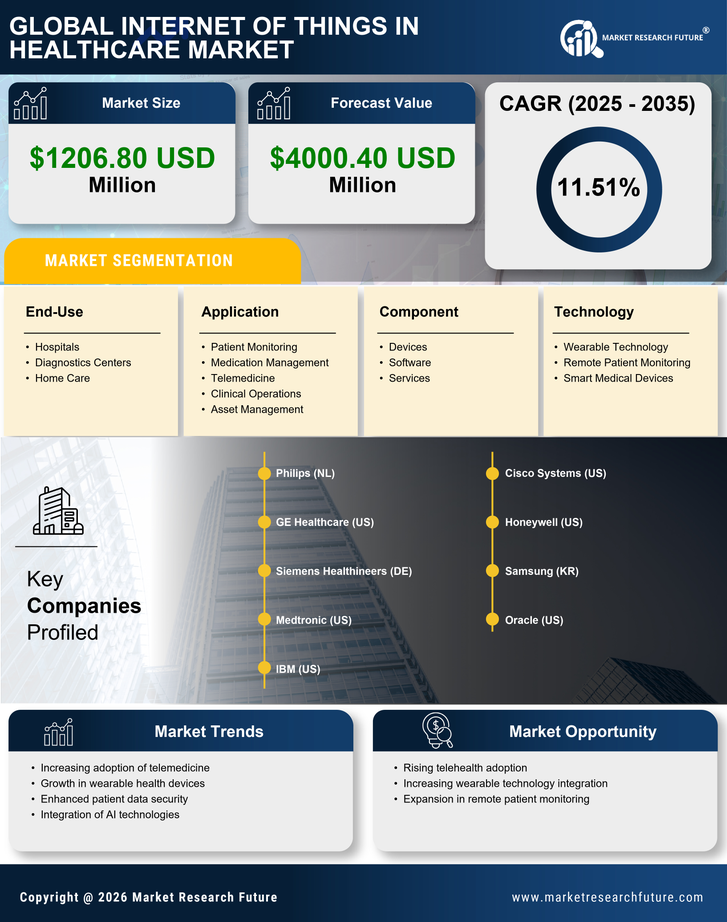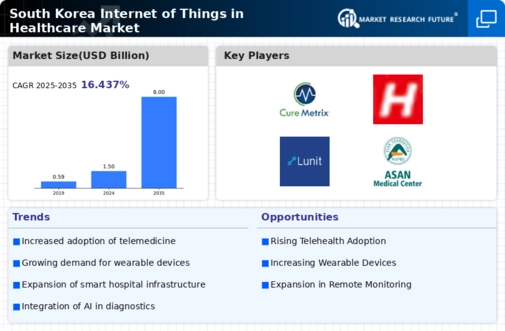Government Initiatives and Support
The internet of-things-in-healthcare market is bolstered by various government initiatives aimed at enhancing healthcare delivery through technology. The South Korean government has implemented policies that promote the integration of IoT solutions in healthcare settings, including funding for research and development. For instance, the Ministry of Health and Welfare has allocated approximately $100 million to support innovative healthcare technologies. Such initiatives not only encourage the adoption of IoT devices but also foster collaboration between public and private sectors. This supportive environment is likely to accelerate the growth of the internet of-things-in-healthcare market, as stakeholders are incentivized to invest in advanced healthcare solutions that improve patient outcomes.
Rising Consumer Awareness and Engagement
The internet of-things-in-healthcare market is significantly influenced by rising consumer awareness and engagement regarding health management. South Korean consumers are increasingly seeking personalized healthcare solutions, driven by a growing understanding of the benefits of IoT technologies. This heightened awareness is leading to greater demand for wearable health devices and mobile health applications that empower individuals to monitor their health proactively. Market Research Future indicates that the adoption rate of wearable devices in South Korea is expected to reach 40% by 2026. As consumers become more engaged in their health, the internet of-things-in-healthcare market is likely to expand, with companies focusing on developing user-friendly and effective health management solutions.
Rising Demand for Remote Patient Monitoring
The internet of-things-in-healthcare market is experiencing a notable surge in demand for remote patient monitoring solutions. This trend is driven by the increasing prevalence of chronic diseases in South Korea, where approximately 30% of the population suffers from conditions such as diabetes and hypertension. Remote monitoring devices enable healthcare providers to track patients' vital signs in real-time, facilitating timely interventions and reducing hospital visits. The market for these devices is projected to grow significantly, with estimates suggesting a compound annual growth rate (CAGR) of around 25% over the next five years. This growth reflects a broader shift towards proactive healthcare management, which is becoming increasingly essential in the context of an aging population and rising healthcare costs.
Increased Focus on Data Security and Privacy
As the internet of-things-in-healthcare market expands, concerns regarding data security and patient privacy are becoming increasingly prominent. With the proliferation of connected devices, the risk of data breaches and cyberattacks poses a significant challenge. In South Korea, where data protection regulations are stringent, healthcare providers are compelled to adopt robust security measures to safeguard sensitive patient information. This focus on data security is likely to drive the development of advanced encryption technologies and secure communication protocols within the market. Consequently, companies that prioritize data protection may gain a competitive edge, as healthcare organizations seek reliable partners to mitigate risks associated with IoT implementations.
Growing Integration of Smart Technologies in Healthcare Facilities
The internet of-things-in-healthcare market is witnessing a growing integration of smart technologies within healthcare facilities. Hospitals and clinics in South Korea are increasingly adopting IoT-enabled devices to streamline operations and enhance patient care. For example, smart beds equipped with sensors can monitor patient movements and vital signs, alerting staff to potential issues. This integration not only improves operational efficiency but also enhances the overall patient experience. The market for smart healthcare technologies is expected to expand, with projections indicating a growth rate of approximately 20% annually. This trend reflects a broader movement towards digitization in healthcare, where technology plays a crucial role in improving service delivery.

















